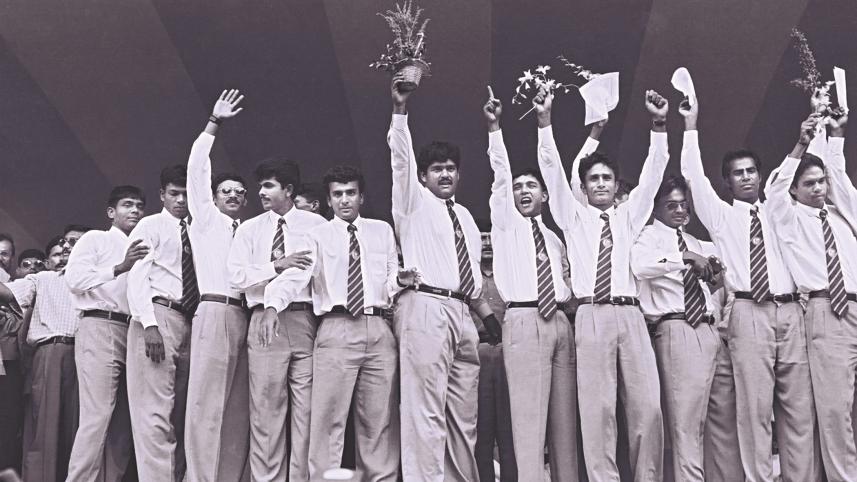Has the ‘tree’ taken root properly?

'April is the cruellest month,' T.S Eliot had written in The Waste Land. Given the current coronavirus crisis the world over, this April is likely to be another cruel month for mankind.
However, April has not always been so cruel to Bangladesh, and one April 23 years ago in particular, had brought reason for massive festivity when the national cricket team secured their maiden berth in the World Cup by winning the ICC Trophy.
Driven by the heartbreak of '94, three years later a team showed what can be achieved with the right processes. National cricketing heroes were born on April 13, 1997, heroes who are still remembered with great respect when one walks down the memory lane. But for one of those heroes, the memories could have been sweeter had growth of cricket in the country been at an optimum level.
Khaled Mashud, nicknamed Pilot, had scored a match-winning 70 against Scotland in the game that mattered the most -- the semifinal -- before playing a cameo in the final to emerge as one of Bangladesh's saviours in difficult moments. During an interview with The Daily Star, Mashud recalled how the final was 'one about happiness' while recalling that they were under 'great pressure' before the semis since 'either you win that or you are out of the World Cup.'
"I had never batted at one-down before, but it just clicked that day. I was instructed to hold one end given that the ball was swinging early on those astroturf wickets. I was like a nightwatchman.
"It was a lot of hard work before the tournament and we became a great team. The preparation was good and we even played in astroturf in domestic league," Mashud recalled.
Who can forget Mashud hitting a big six off Martin Suji or Hasibul Hossain Shanto stealing a single off the last delivery to clinch the enthralling final? 23 years on, those images remain iconic for our cricket.
"It was a great feat to beat Kenya, who were already playing in the World Cup," Mashud said.
For him, the feat of winning the ICC Trophy was 'like planting the tree from which everything would take root' in Bangladesh cricket.
"Had we failed, maybe there wouldn't have been the enthusiasm to develop cricket and move forward. Had we lost, maybe we wouldn't have played Tests in 2000 and we would have to wait for everything for four more years," the wicketkeeper-batsman reflected.
But looking back at the times that have passed since that triumph, the now successful domestic coach has a tinge of quiet regret.
"Except for India, cricket is not as popular anywhere else in the world as it is in Bangladesh. I feel that in these 23 years, Bangladesh should have been a better team. I think we could have performed 30 percent better had we focused on the structures and processes, especially on how players come up through the system and how to create structures for that. We are improving. There is money coming into cricket and facilities have improved and the board is rich, but process-wise, we are lacking.
"We have passed two to three generations of players after becoming a Test nation. We should have not only had a strong eleven but a batch of 40 players who could be at a level close to India's.
"We needed a better plan so that no matter who comes into the board, the process doesn't change. There has only been one cricket academy in Mirpur in all this time. It doesn't require money but a good thought process to reach that level," Mashud lamented.
Asked about the recent players' strike, Mashud said: "I don't know what the public perception is but what they wanted [during the players' strike] was the right thing. Think about it, if Shakib [Al Hasan], Mashrafe [Bin Mortaza] or Tamim [Iqbal] don't work for Bangladesh cricket after retirement, if their opinions are not sought, it won't affect them but it would be a huge loss for our cricket."
And this had happened in the past too, Mashud opined. "Look at our former players like Akram [Khan] who is now the Cricket Operations Chairman or Khaled Mahmud in Game Development. There should be others to shape structure but it would have been more crucial if former players were involved with the next generation. Things such as how Akram bhai used to build his innings should be shared at field level. [Minhajul Abedin] Nannu bhai and Habibul Bashar are selectors now, but they could have been batting consultants. Their experience would have been crucial."
The development that is hoped for could have been possible. Mashud drew on the example of FC Barcelona in order to find the talents and said: "They [Barca] have a process. BCB should have enlisted all cricket academies in the nook and corner of the country. They should have categorised the academies according to quality of service provided. A standard should have been set and the BCB should have then assessed if the right way of training was taking place. Groom the coaches and provide a training structure for them. That's what they could have done," Mashud said, reminding that the tree ultimately did not take root the way it should have.



 For all latest news, follow The Daily Star's Google News channel.
For all latest news, follow The Daily Star's Google News channel.
Comments